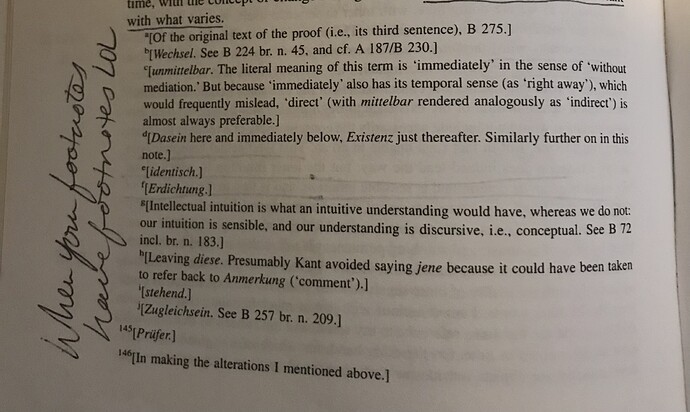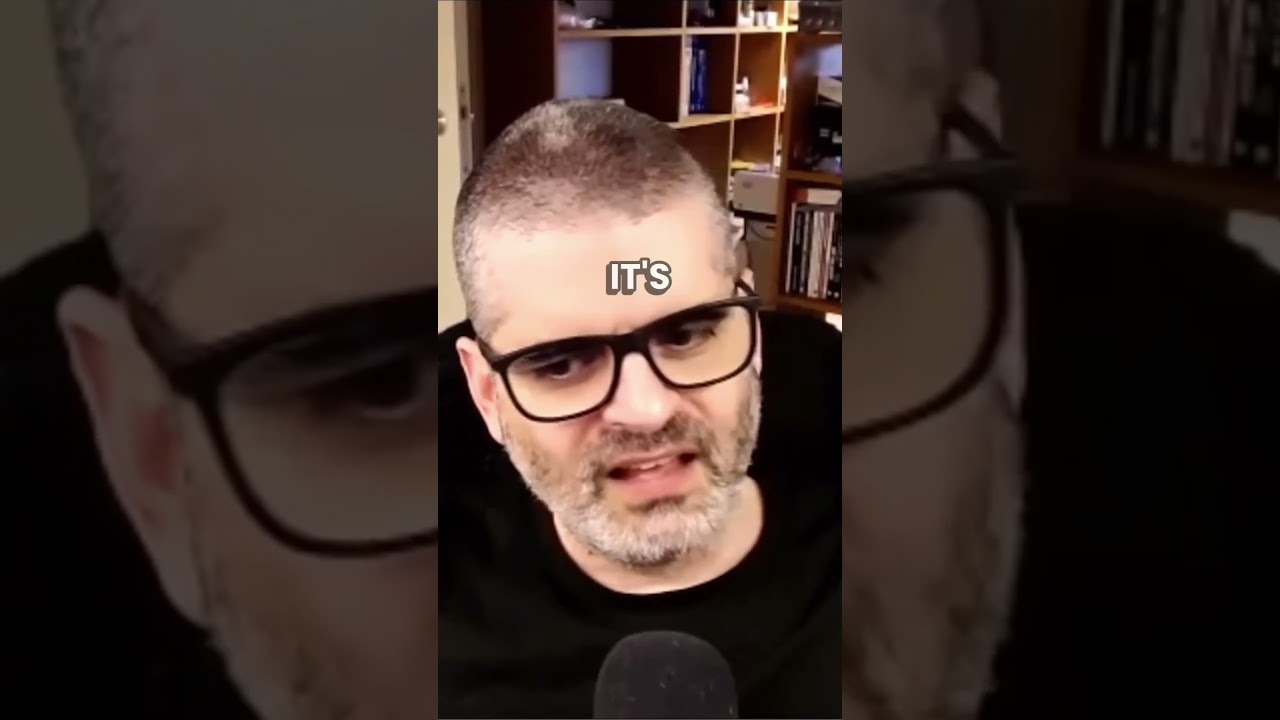Thank you for helping me articulate them in a way that clarified things for you. Except for …you’re the one that did that. So I guess just thanks for asking instead of just assuming. That should happen more often than it obviously does judging by how philosophers have been bungled (misinterpreted and thus mistaught) — even after they clarified themselves! (Thinking of how Descartes clarified himself to Hobbes, for example… thx Dr. Z for that.)
One reason not to identify with one’s intellect:
See also: King Nebby
‘The consciousness that you are is not attached to the stream of perceptions, thoughts, images that pass through it. Let them come and let them go.”
…
This also has been my experience, invariably, except when we possess the power to will to descend , that is to slow the rate of flow down to an appreciable level, where the content of images can be discerned in individual frames of reference.
The Vedantists say “Atman is Brahman”. The true Self reflected through the intellect, the mind, the body and the senses by which the world is perceived is Satchitananda —- being, consciousness and bliss. That is what you are. It is because of the limitations of the mind that you see the world otherwise. The aim of jnana yoga is to dispel this ignorance.
Whatever can be divided is or will be. Wishing, hoping and praying won’t put Humpty back together again.
Praying and hoping can be good motivators but of course above all, having the vision and
intention and rising to the occasion and the challenge of putting poor Humpty back together again and doing just that will make Humpty whole again though transformed.
After all, if David came into existence from a block of marble, just think of the newly-transformed Humpties.
Someone is first an anonymous constitution, which varies in vitality from one constitution to another. What a person deems themselves to be is defined by their response reactions to the physical world as cause/context. This no doubt affects the constitution and affects reactions of said constitution, which are then causes in the world. Personality is formed by the various forms of pains and pleasures the context delivers to a thus conditioned constitution. Someone is the entity/ and altered constitution that is defined by its emotions, intellect, and physical demeanor in its reactions to the physical world/context. Someone is the state of their constitution in context.
According to Kant’s critique of pure reason, the I or ego cannot be made into an object as if it were a thing in the world. If it thinks about itself making itself objective to itself, it’s object there’s always only a past moment of the self for the self is always actively thinking and this never becomes its own object. In other words, what the self can fix of itself to think about is always a past moment while thinking continues. The ego is always already prior to and the condition of whatever the object happens to be. While, a certain thought itself can be an object, thinking itself is spontaneous activity, and as such always already beyond any attempt to objectify itself to itself.
Further, according to Kant, the ego is the unity of all experience. He called this the “transcendental unity of apperception.” Vedantists agree that this is what individual self consciousness is, but assert that this is only a reflection of universal consciousness that we ultimately are.
F.D., what did Kant say of intellectual (versus sensible) intuition, and intuitive (rather than discursive, i.e. conceptual) understanding?
…also from CPR.
Why do you ask?
Would Vedantists say it is the universal consciousness that they/we ultimately are?
What of maximally great irreducible quality?
The shape of everything that is “in the image of” without reducing/“progressing” to nihil?
Yes.
That’s what you ultimately are.
Yes. Infinite and eternal and immutable, without beginning or ending.
We don’t see this because we are ignorant of our true identity. Jesus saw it. He sought to reveal this to others. Instead, they worshipped him and it became a religion.
The universe of things exists to the finite mind which projects in categories of space, time and causality as Kant expounded it in CPR. The Christian mystic Meister Eckhardt said “The ground of God and the ground of my soul are one and the same.” As it says in the Upanishads “when all the knots that strangle, the heart are loosened, the mortal becomes immortal.”
Why do you pitch what you don’t believe about yourself to a me you think is fishing for it? Also… is that a fat joke?
Where can a Vedantist be quoted/videod saying that?
About himself. Not about you/me. & he accepted worship & claimed divinity. That’s why he was crucified, and nearly stoned more than once before that. We are made in his image, that is why he commands us to treat each other as self, to love each other as he demonstrated. But he shows the father because he is from the father. Stark contrast.
It was Siddhartha Guatama who said he was not to be worshipped as divine. (Ironic.)
No further questions, your honor.
That doesn’t make sense. You asked a question, I answered it.
“ Tat Tvam Asi is one of the most famous phrases from the ancient upanishadic texts. But what does it mean?
Tat = that
Tvam = thou or you
Asi = art or are
Tat Tvam Asi = That thou art, or thou art that, or you are that
‘That’ refers to the Absolute. ‘You’ normally refers to the limited separate body-mind identity known in advaita vedanta as the jiva, but in this aphorism from the Upanishads it is implicitly declared, via the word ‘asi’, that you are not the jiva but the Absolute.”
That’s the dualistic, orthodox, exoteric doctrine. If you’re satisfied with it, fine. We need discuss the matter no further.
“Thou art that” seems to contain a distinction between thou and that. Does it mean the same as self=other?
Self=other might make sense in a dualistic world. But, if there is only one, there is no other.
One reality, yes.
Many persons.
Both/all tripartite.
Js.
You have posted about that a lot on ILP. Your thinking seems to be based on Trinitarian theology.
https://youtube.com/clip/UgkxEdaNKE1E7OceSW42kmeENGtzbShXr0Cb?si=dNQbdpHYJeYo5mps
https://youtube.com/clip/UgkxeyXr50lrJzNSD1YRpNKsUjguR6aI9SKM?si=Q1-Q0YZPcZvKk865
It seems you can’t decide if I’m dualistic or triunistic. Evil is privation, and there is no absolute privation—I’m not dualistic.
There can be no “one” without wholeness. No “thou”/that without subsumed otherness.
agent / patient & the _______
active / passive & the _______
source / sink & the _______
subject / object & the _______
self / other & the ________
doer / done to & the _______
a collection of people, versus a united group… & the _____
To my mind you often present a mishmash of half-baked ideas. I am familiar with the privation solution to the problem of evil which goes back to Saint Augustine.
As Bertrand Russell put it “Pain and hatred and envy and cruelty are surely things that exist, and are not merely the absence of their opposites.”
As I came to see thinking about wholeness doesn’t make a person whole. I started a thread on the subject in 2020. I was inspired by Carl Jung who thought that wholeness was the telos of individuation. Godel’s incompleteness theorem may apply to every system the mind can produce. As Nietzsche said in Zarathustra: “ And this secret spake Life herself onto me “Behold” said she, “I am that which must ever surpass itself.”
Your series of opposites and blanks reminds me of Hegel’s dialectic. Perhaps trying to surpass yourself is what that’s about.

